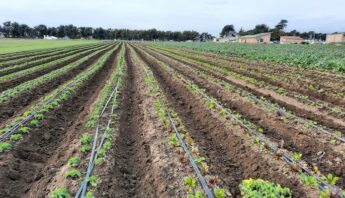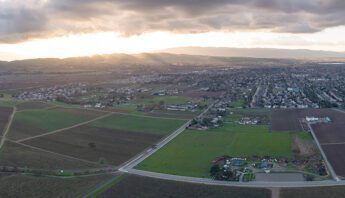Advocates express concern that the newly released draft Scoping Plan prioritizes corporate interests over meaningful climate action and environmental justice, especially in the agricultural sector.
For Immediate Release – May 10, 2022
Sacramento, CA – Today, the California state government released a draft of the Scoping Plan – the roadmap for how the state will become carbon neutral by mid-century. For the first time, the Scoping Plan acknowledges the role that organic agriculture and reductions in chemical pesticide use could play in mitigating climate change. Less chemical-dependent farming, like diversified organic farming, has significant potential to help mitigate climate change through storing carbon in soils and reducing greenhouse gas emissions. However, the plan falls short in committing to meaningful targets and strategies that would transition the state towards more ecologically-sound and socially-just agricultural systems.
Pesticide Action Network’s Organizing Co-Director for California, Asha Sharma, issued the following statement:
“The draft roadmap includes a commitment to 20% of agricultural land being organically-farmed by 2045. That would mean that conventional, industrial agriculture would still make up 80% of agricultural land by mid-century. This target does not even keep pace with the current market growth of organic production in California, where organic production increased by 44% from 2014 to 2019. At this rate, organic agriculture would make up 34 percent of total agricultural land by 2045 in the absence of state-supported incentives or regulation.
Meanwhile, the state fails to set any goal for chemical pesticide use reduction, despite the scientific evidence of pesticides’ contributions to climate change and repeated calls from the Scoping Plan’s Environmental Justice Advisory Committee to include a pesticide reduction goal in the plan. Reducing chemical pesticide use would have enormous health benefits for environmental justice communities. People of color in California, particularly farmworkers and rural Latinx families, disproportionately bear the brunt of the health hazards associated with the use of dangerous chemical pesticides.
By leaving a pesticide reduction goal out of the Scoping Plan, California state officials continue to turn their back on environmental justice communities while ignoring science.”
Californians for Pesticide Reform’s Organizing Director, Angel Garcia, shared the following statement:
“Any proposed climate plan needs to embrace the most ambitious goals possible that will bring the greatest and most immediate benefit to impacted communities. This Scoping Plan fails to deliver the urgent and strong action on agricultural emissions that the climate crisis requires. Food produced with minimal or no use of synthetic pesticides would vastly improve the health and well-being of Californians and help California realize its potential as a global leader in the fight against climate change and social injustice. State officials must amend the draft plan to include more ambitious goals that transition California agriculture towards a more equitable and less chemical-dependent farming system.”






